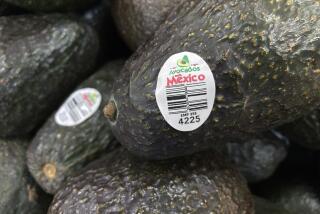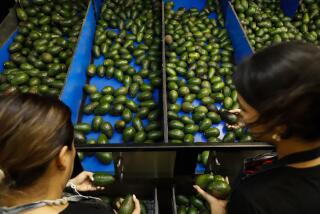U.S.-Mexico tomato trade agreement finalized
After months of wrangling, the U.S. and Mexico signed a new tomato trade agreement late Monday, officially suspending an antidumping investigation of fresh tomatoes from south of the border and raising floor prices for Mexican tomatoes.
The agreement, announced in February, prevented a trade war between the two countries.
U.S. growers in Florida had accused their Mexican counterparts of selling their tomatoes below fair market value -- a practice known as dumping -- and last year asked the U.S. Commerce Department to scrap the 17-year-old trade agreement.
The pact “provides an effective remedy for the U.S. domestic industry that protects American jobs,” said Paul Piquado, U.S. assistant secretary of commerce for import administration, in a statement.
“It includes important mechanisms that strengthen our ability to enforce the agreement and maintain required coverage of Mexican tomato imports, thereby helping American tomato growers to compete on a level playing field,” Piquado said.
In the last decade, U.S. growers struggled to compete with Mexico, which ramped up its fresh tomato production. Exports from that coutry reached $1.81 billion in 2011, more than quadruple the $412 million in 2000.
Mexican growers and importers worked closely with Commerce Department officials to draft a new agreement. There have been three previous suspension agreements covering imports of fresh tomatoes from Mexico -- in 1996, 2002 and 2008.
Martin Ley, vice president of Del Campo Supreme, who represented Mexico growers, lauded the new trade agreement.
“After nearly nine months of sometimes difficult conversation and negotiation with the U.S. Department of Commerce, Mexican growers will be able to continue to focus on their highest priority: producing high-flavor, naturally vine-ripened tomatoes that over the last two decades have won the favor and allegiance of growing numbers of American consumers,” Ley said in a statement.
ALSO:
Brewers launch new Los Angeles craft beer company
Las Vegas Sands Corp. faces scrutiny in Macau, Spain
Monster says no evidence its energy drink killed girl, 14
ricardo.lopez2@latimes.com
More to Read
Inside the business of entertainment
The Wide Shot brings you news, analysis and insights on everything from streaming wars to production — and what it all means for the future.
You may occasionally receive promotional content from the Los Angeles Times.









